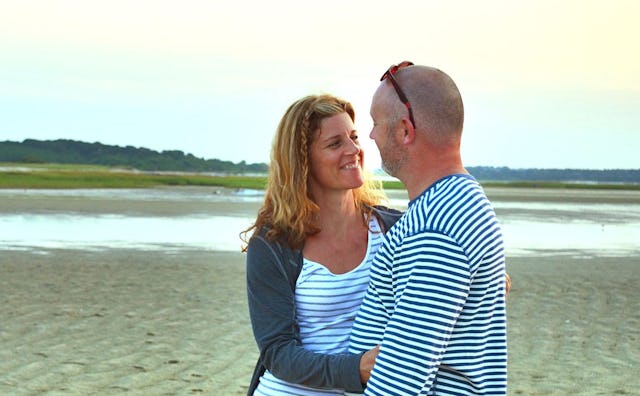When You Marry 'The One,' You Also Marry The Family

I don’t know what I expected to change. I guess I thought that in taking on the last name Magee, I’d become a part of Sean and he a part of me. I never imagined it meant that my traditions, aversions and general way of thinking would be challenged.
Why? Because I wasn’t just marrying Sean, I was also marrying into his family.
Marrying into a family is much like travel: There will be amenities or traditions that you embrace and that change your worldview, and moments you’ll return to again and again to savor. You will adapt and soften as you accept that certain things are simply out of your control. But there will also be times when the ache to be home and surrounded by what is familiar and comforting will be blinding. There will be a childlike argument with your spouse at the back of your throat: “I just want it to be how it was, but with you in it with me.”
But these are things I didn’t know back then when we got engaged. The first whisper of change was his family’s resistance to the idea of a non-church wedding. Pinterest didn’t exist, but I’m sure my vision for a wedding is probably all over it now—a romantic barn, hay bales with patchwork quilts draped over them, twinkly lights strung from the rafters and wildflowers.
“I’d like to do something outdoors, very rustic,” I said proudly.
My future mother-in-law, a tiny woman with a love for flowers and ceremony, said, “You wouldn’t want to do something in a church?”
I shook my head. “No, I’d really like to get married outside. I don’t go to church, so it feels strange to think about being inside one.”
She was quiet. I didn’t yet understand that “Don’t you want to…” is code for “I’d really like it if you….” I wasn’t, and still am not, inclined to change my mind to make someone else happy. It seems like it should be OK to like the things you like, but marriage doesn’t always play that way.
After we were married and had kids, I taught our daughters early on to refer to their body parts by name. I didn’t want euphemisms for vaginas. My daughter Briar once told Sean’s dad, an enormous teddy bear of a guy who works as an ultrasound tech, a story about going to the water park.
“We were going on the slides, and it was very fun. It’s neat how your pee feels hot after swimming. Does yours do that? Also, after, my vagina got burny for a couple of days,” she explained before skipping off to play in the other room.
He turned to me and mouthed the word “vagina” before saying, “Vagina? She calls it that?”
I was stunned. “Yes, it’s what it is,” I said.
“I know, but don’t you think she’s a little young?”
“How are you too young to know the names of your body parts?” I asked defensively.
He shrugged, a gesture that said we could make these decisions while also conveying it wasn’t what he would do. I spent days thinking about it and wondering how often decisions we made would be questioned. The answer was a lot, from not having a hemangioma removed from Briar’s forehead to nursing the girls for two years each.
I come from a family that favored debate over dessert, and travel over togetherness. Where Sean’s family whispers over family discord, my family has a “Fuck ’em” attitude. That’s probably why we didn’t have large family gatherings for Thanksgiving, or any holiday for that matter. All I ever knew was the four of us, occasionally joined by my grandparents. We didn’t send out family newsletters or photos.
Stated in pop culture terms, Sean’s family was Hallmark; mine was Netflix.
Thanksgiving is a very important holiday to Sean’s mom, as are Easter and Christmas. Each holiday that rolls around is preceded by lengthy discussions about who will bring what and what time things will start. Over the years, my mother-in-law has softened, but there is still an undercurrent that we’re not measuring up or that we’re being difficult.
For one such holiday years ago, she suggested that we come for the meal at 1 p.m.
“That’s right when the girls nap,” I said to Sean. He nodded. We were thick in the new parenting stage and singularly focused on the needs of our family; she was similarly set on adherence to tradition.
It was a game of battleship between vessels of matriarchal rule, one ship sunk by naptime, another by centerpieces and ritual. Regardless of the time we arrived, it always seemed a little too late (“I hope the bird hasn’t dried out”), or the items we brought were no longer needed (“I went ahead and made that”).
Undoubtedly the moment would come when she would ask, “Would you like seconds?”
“No, thanks,” I’d say.
“You sure you wouldn’t like some more mashed potatoes? Another roll?”
I’d shake my head tersely, hating my petulance. I should be able to eat a few spoons of anything, right? But why the hell should I have to?
Marriage, I guess.
I wish in all those whispered tips for a good marriage, someone would have warned of family in the matrix. It isn’t our fault, but it is ours.
We marry the holidays and drunk uncles, the things that aren’t talked about and the way it’s always been. What was and what we grow into can never live within the same moment, and so we must learn a new language and weather different time zones.
Happily ever after is really being able to stagger away from the extra and fall into the arms of the person we chose to marry and feel our perfect fit in spite and because of it all.
This article was originally published on